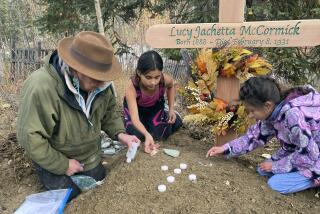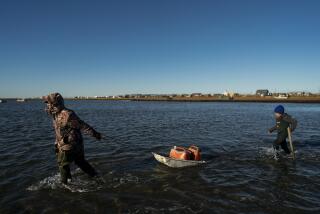Teenâs Suicide Jolts Eskimo Community
GRISE FIORD, Canada â His friends noticed nothing especially amiss on the last night of Terry Akeeagokâs brief life.
That evening he had played hockey. The townâs team had recently chosen the quiet, moody 18-year-old to be its goalie in a coming tournament. His grandfather had planned to take him out to the edge of the sea ice the next morning to hunt polar bears.
Instead, Akeeagok went home from the hockey game, turned up some rock music on the stereo in his room and hanged himself with a telephone cord. He left no suicide note.
âThere was no warning,â said Raymond Mercredi, who dug the youthâs grave with a jackhammer in the frozen earth of the small cemetery overlooking Jones Sound. âEverybody feels a little bit guilty, as if they should have seen this coming. Was there something someone could have done?â
The first suicide in the history of Grise Fiord--the northernmost community in North America--has badly shaken this tiny outpost of humanity in the arctic wilderness.
Grise Fiordâs 135 Eskimo residents, called Inuits in Canadaâs Northwest Territories, take pride in adhering to the rugged traditions of their nomadic hunter ancestors. They believe this has helped them to stay relatively free of the social ills that have befallen more southerly communities: drug and alcohol dependence, family violence--and suicide.
The suicide rate in the Northwest Territories is four times higher than elsewhere in Canada.
Suicide in the high arctic is âsort of the tip of a whole iceberg of social ills,â said Angus MacKay of Yellowknife, a government social services official.
âIt all relates to the breakdown of the traditional Inuit lifestyle, values, culture,â MacKay said. âThereâs a generation coming up right now that has no real connection with the past and little opportunity to take advantage of the benefits of the new society that theyâre faced with. They get caught in this void between two worlds. That creates a feeling of hopelessness among certain individuals.â
There is little evidence that these adversities afflicted Eskimos so severely during the thousands of years that they lived in scattered primitive hunting camps. But during the 1950s and 1960s, the Canadian government encouraged or forced them to abandon their camps for central planned communities.
The new communities offered assorted blessings of Western civilization: prefabricated housing, heating fuel, grocery stores, schools, police, and telephones and television for connection to the outside world.
Older people in the communities complain that now, young people no longer listen to them, much less turn to them for guidance.
They buried Akeeagok on a bitter cold morning that happened to be the 65th birthday of his grandfather, Abraham Pijamini.
Pijamini, Grise Fiordâs oldest resident, spoke at length during the funeral service in the communityâs one-room Anglican church. âIf there is anyone here who doesnât feel good about anything, they should talk about it and get it out,â said Pijamini, gently shaking his finger at the children. âAnything thatâs bad, you should talk it over with someone, then go on and live a good life.â
Raymond Mercredi and five other men loaded Akeeagokâs pine coffin onto a pickup truck for the trip to the snow-covered hillside cemetery. Tiny ice crystals floating down from a high cloud made the air glisten eerily.
The minister spoke some more words, and then the pallbearers lowered Akeeagok into his shallow grave. His mother threw in a red rose and turned away.
But no one left. The men began shoveling the dark, rocky earth onto the coffin. Loud wails suddenly erupted from the circle of mourners, who had been reverently quiet until then. Finally, as rocks were being set around the edge of the grave, an anguished but insistent voice rose above the wordless moaning. It was Angnakaolak, an elderly great-aunt from Arctic Bay.
âAll life has to go this way and stop this way,â she proclaimed, swaying as she spoke. Tears coursed down her weathered cheeks. âWe can only walk away from it and go on living.â
More to Read
Sign up for Essential California
The most important California stories and recommendations in your inbox every morning.
You may occasionally receive promotional content from the Los Angeles Times.










